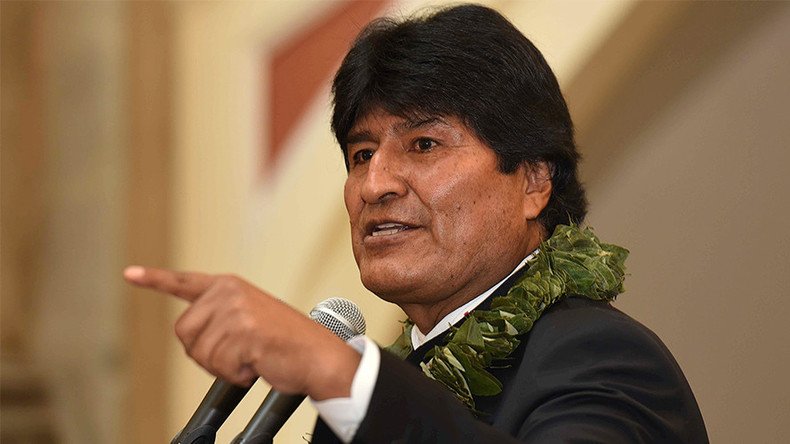‘Selfish, conceited mindset’: Bolivia president to RT on US handling of N. Korea (EXCLUSIVE)

The US is among states which have a “selfish and conceited mindset” regarding the North Korean issue, Bolivian President Evo Morales has told RT in an exclusive interview. He also noted that Syria is crucial for gaining control over the Middle East.
“I don’t understand how the governments of some countries, the US president, for example, have such a selfish and conceited mindset. Every administration should think of humanity in the first place and respect nation’s identity, equality of states,” Morales told RT en Espanol.
He went on to say that a “war involving nuclear bombings, a nuclear war… would affect not only the warring parties but all mankind, the whole planet.”
Tensions have been escalating between Washington and Seoul on one side and Pyongyang on the other in recent months.
While the US and its Western allies slammed North Korea over its missile tests, Pyongyang lashed out at Washington over its deployment of the THAAD missile system to South Korea and joint military drills with the South.
Earlier this month, US leader Donald Trump said he had dispatched a powerful “armada” to the waters close to the Korean Peninsula. Pyongyang lambasted the move, saying also that American military presence may lead to a nuclear war breaking out “at any moment.”
On the Syrian issue, Morales said the country “has strategic importance for control over the Middle East," adding that the war in Syria is part of some world powers’ global strive for natural resources.
“The situation that we see today raises concerns and fears: some world powers are seeking to conquer other countries out of geopolitical reasons. Their age-old goal is to gain control over the natural resources,” the Bolivian president said, adding that it was the case in Libya and Iraq and is the real agenda behind the war in Syria.
“I’m convinced that 30 percent of the world’s hydrocarbon resources are concentrated around Syria. It brings us back in history, when empires under the rule of monarchies divided the resources. Today the empires carry out interventions, using military bases and submarines, in pursuit of the same goal – to gain control over natural resources,” Morales said.
In early April, Bolivia was the one to call a closed-door of the UN Security Council after Trump administration ordered missile strikes on Syria’s Al Shayrat Airbase in response to the alleged chemical attack in Idlib, blamed by Washington on the Assad government.
However, the US envoy to the UN, Nikki Haley, has rejected the proposal. Her Bolivian counterpart, Sacha Llorenti, also blasted Washington’s unilateral decision, accusing it of becoming “the investigator, the prosecutor, [and] the judge.”
Morales also spoke on the turbulent political situation in his own region, referring to the anti-government protests in Venezuela as “a coup d’etat, driven by the right.”
“I feel sad that the Organization of American States [OAS] keeps on its tradition of coups, which is the primary means of the North American empire,” he said.
The Bolivian president added that the US only cares about democracy when their interests are threatened but “when it is not in their interests, there is no democracy and no human rights for them.”
“The US criticizes anti-imperial governments … and the US allies are all monarchies or oligarchies.”
Anti-government rallies in Venezuela have been going for more than four weeks now, leaving at least 29 people dead.
The opposition demands fresh election, release of jailed activists and autonomy for the opposition-led National Assembly. Although President Nicolas Maduro has agreed to hold elections, the date is yet to be set.














